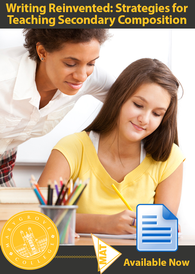 We’re nearly halfway through the month and we just realized that April is National Poetry Month! (Did we just hear your students let out a groan or was that you?) Why do so many students distrust poetry? Perhaps it is because so many poetry lessons are rife with intimidating words like “iambic” and “pentameter,” or because they’ve spent more time identifying rhyme schemes and stressed and unstressed syllables than they have simply enjoying an impeccable turn of phrase. Robert Frost once said that free verse poetry is “like playing tennis with the nets down.” Mr. Frost may not approve, but we want to help you take down the nets this month and give your students two less conventional poetry lessons.
We’re nearly halfway through the month and we just realized that April is National Poetry Month! (Did we just hear your students let out a groan or was that you?) Why do so many students distrust poetry? Perhaps it is because so many poetry lessons are rife with intimidating words like “iambic” and “pentameter,” or because they’ve spent more time identifying rhyme schemes and stressed and unstressed syllables than they have simply enjoying an impeccable turn of phrase. Robert Frost once said that free verse poetry is “like playing tennis with the nets down.” Mr. Frost may not approve, but we want to help you take down the nets this month and give your students two less conventional poetry lessons.
No More Poetry-Induced Groans: 2 Unconventional Poetry Lessons
Let Them Try the Cut-Up Technique
Cut-up was a literary technique used by Dadaists, but it’s most commonly associated with beat writer William S. Burroughs. Unlike traditional methods of composition, cut-up is aleatory, which means that the creative process is left to chance. Here’s how Dadaist writer Tristan Tzara used to create his cut up poems:
- Take a newspaper and scissors
- Choose from this paper an article of the length you want to make your poem
- Cut out the article
- Next carefully cut out each of the words that makes up this article and put them all in a bag
- Shake gently
- Next take out each cutting, one after the other
- Copy conscientiously in the order in which they left the bag
- The poem will resemble you (we’re not sure what he means by this, exactly)
- And there you are – an infinitely original author of charming sensibility
If you’d like see how William S. Burroughs created his own cut-up poems, you can stop by our website to view it.
Try Using Paragraph Scrambler
Paragraph Scrambler gives you the ability to plug in text, scramble and randomize it to your heart’s content. Here’s a screenshot of what Paragraph Scrambler did to the well-known Robert Frost poem, “The Road Not Taken”:

Pretty crazy, huh? Our students have used paragraph scrambler to “remix” well-known poems and you can place as many or as few rules on this activity as you like. We’ve taken what seem to be incoherent lines, written them on the board, and collaborated with our students to delete words, add and move lines around so that we could make meaning of the “remixed” poem. If you decide to let your students try out these two unconventional poetry lessons, please let us know how it goes!
Tags: Burroughs, Cut-up, Method, Month, National, Poetry, S., William
Replies to This Discussion
-
This is a fun idea and would be neat to try, especially with some vocabulary words. But I think it's mainly the pressure of doing homework with poetry, instead of simply enjoying it, that makes it such a chore. What about another idea for helping children enjoy poetry--give them fun (and/or funny) poems to read and expect nothing from them. Make it a "you can like this or not--it doesn't matter" issue, and simply expose them to the fun of rhythm and rhyme, or give the kids drums and let them beat it out while someone reads it and another person acts it out. Use some Shel Silverstein, Jack Prelutsky, or Kenn Nesbitt.
-
All good ideas, Laurie. Thanks for sharing.
© 2025 Created by Steve Hargadon.
Powered by
![]()
